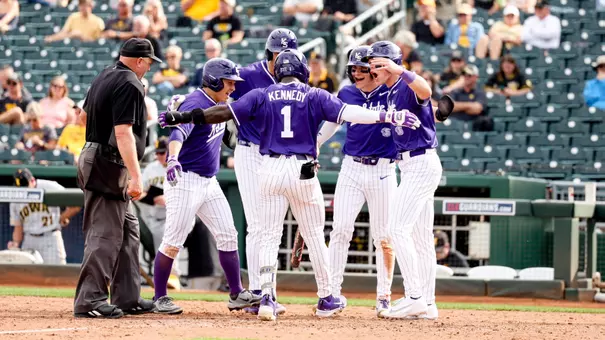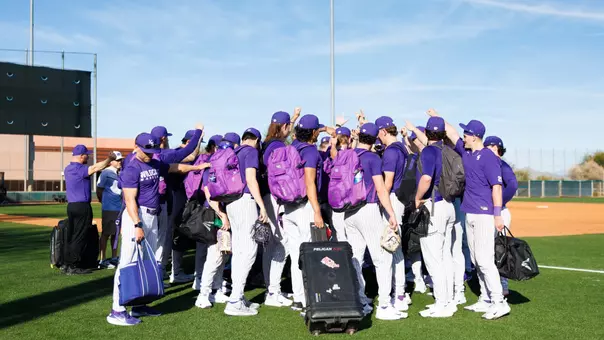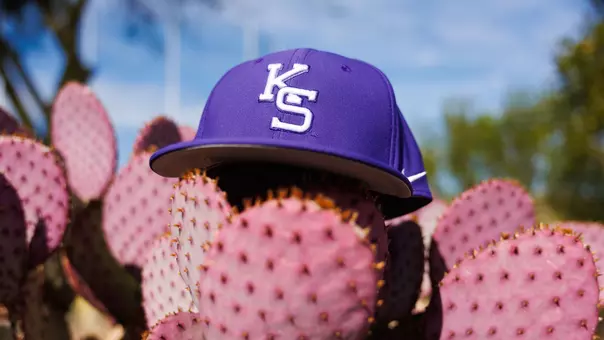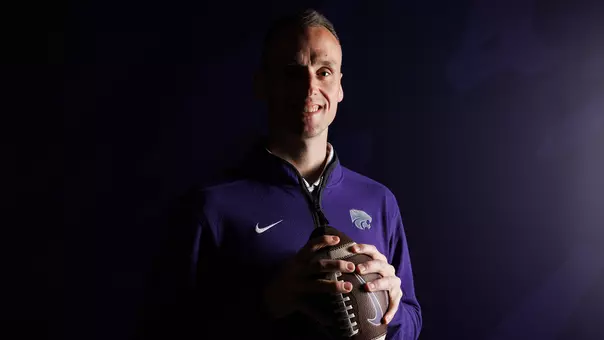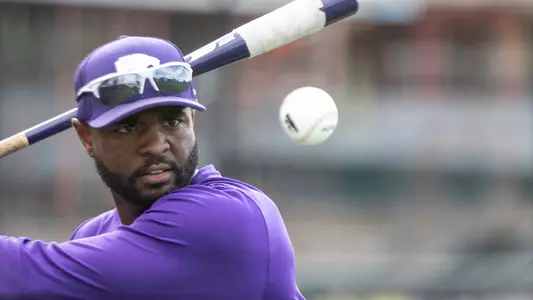
SE: Austin Wates Shares Thoughts on Equality Fight and Representation in College Baseball
Jun 15, 2020 | Baseball, Sports Extra
By: Austin Siegel
He knew what he wanted to say, but Austin Wates took a few days before hitting send.
"I am hurting. I hurt for these families, for the black community and for our country," he wrote. "This is the unfortunate reality that black people in our country face every day. There is something to be said about this moment, it feels different than Mike Brown in Ferguson, different than Freddie Gray in Baltimore, different than any point in my life. But it's no different for any of these families that have lost loved ones, they grieve and hurt just the same."
In a message he posted to social media, Wates wrote about victims of police brutality and the protests that have continued across the country.
Wates said his goal was to write something that would resonate with as many people as possible. As one of the only black coaches in college baseball, few can offer his perspective.
In a sport that has struggled to increase African American participation at all levels, college baseball dugouts are an increasingly stark reminder of just how far the game has to go.
The Institute for Diversity and Ethics in Sport (TIDES) at the University of Central Florida keeps track of minority representation across the NCAA and released their 2019 findings this month.
According to the TIDES report, there are 744 assistant coaches in D1 college baseball. Wates is one of just 14 black assistant coaches in college dugouts across the country.
"It's an amazing thing to even say out loud," he said. "When I'm on the recruiting trail, I see that, but it's not necessarily the first things that pops into my head."
Wates has crammed plenty of different roles into a baseball life that began at Virginia Tech, where he was a star for the Hokies under current K-State head coach Pete Hughes. In three seasons in Blacksburg, Wates hit .346 while leading the Hokies in steals every season.
A third-round draft pick of the Houston Astros in 2010, he played six seasons in the minors before joining the Mariners as a scout. After two seasons with Seattle, he returned to the college game under his former coach at K-State.
As a player, scout and assistant coach, Wates said he recognizes that college baseball isn't an accessible sport for potential student-athletes from lower-income families.
"Kids from inner-city families just don't have the opportunity to play summer ball and get those at-bats," he said. "These travel ball teams cost three grand to play summer baseball, and if I'm a kid who doesn't have that kind of money or my family doesn't have those resources, it's easier for me to pick up a basketball and go join a pick-up game."
While working in Texas as a Mariners scout, Wates got involved in the Austin chapter of Major League Baseball's RBI program, an outreach initiative that introduces the game to young players in underserved communities.
"I'm passionate about that stuff. I want there to be better opportunities for lower-income families to get into the sport," Wates said. "It's such a great game. But I know the number of black coaches in our sport is not representative of the number of black players."

Even as these outreach programs work to make baseball more accessible, college coaching staffs continue to lag behind.
While more than one in five D1 college baseball players were a minority student-athlete during the 2018-19 season, 93 percent of college baseball coaches were white.
For black college baseball coaches? That number was 1.6 percent.
Dr. Richard Lapchick of the TIDES program was clear in his summary of this month's report.
"This year has been a year of growth for college sport as race, gender, and overall grades have all seen increases," Lapchick wrote, "[But] collegiate baseball has shown repeatedly that improving representation from a coaching standpoint is not a priority."
Wates pointed out that college baseball coaching staffs have just two paid assistant roles, with other coaches earning a living through baseball camps held outside the season.
In October, the NCAA declined to revote on a proposal that would have added a third paid assistant role to coaching staffs at baseball and softball programs throughout the country.
"It's really hard if I played seven or eight years of minor league baseball, I have a two-year-old kid and a wife, and I'm at a smaller school that might not bring in a lot of camp money, how do I support my family on almost nothing, with no health insurance," Wates said.
The proposal can be voted on again in 2021, an opportunity for the NCAA to change a rule that Wates said, "hurts our game."
In the meantime, Wates is focused on preparing the Wildcats for a season in which he expects many of the seniors who missed out on the 2020 season to return. But after a white police officer killed George Floyd and protests began across the country, he shared his perspective, as part of the how-is-this-a-real-number 1.6 percent of black college baseball coaches.
"I think sometimes people forget that it's not necessarily a fight where I, or any black person, wakes up every morning and want to be fighting for that stuff," Wates said. "I want to be a baseball coach. But at the end of the day, it's my life. It's my kid's life and for future generations, I think it's important that we continue to take a stand."
He knew what he wanted to say, but Austin Wates took a few days before hitting send.
"I am hurting. I hurt for these families, for the black community and for our country," he wrote. "This is the unfortunate reality that black people in our country face every day. There is something to be said about this moment, it feels different than Mike Brown in Ferguson, different than Freddie Gray in Baltimore, different than any point in my life. But it's no different for any of these families that have lost loved ones, they grieve and hurt just the same."
In a message he posted to social media, Wates wrote about victims of police brutality and the protests that have continued across the country.
🙏🏾 Thoughts on this moment pic.twitter.com/n4c6KH4ZXP
— Austin Wates (@austinwates) June 5, 2020
Wates said his goal was to write something that would resonate with as many people as possible. As one of the only black coaches in college baseball, few can offer his perspective.
In a sport that has struggled to increase African American participation at all levels, college baseball dugouts are an increasingly stark reminder of just how far the game has to go.
The Institute for Diversity and Ethics in Sport (TIDES) at the University of Central Florida keeps track of minority representation across the NCAA and released their 2019 findings this month.
According to the TIDES report, there are 744 assistant coaches in D1 college baseball. Wates is one of just 14 black assistant coaches in college dugouts across the country.
"It's an amazing thing to even say out loud," he said. "When I'm on the recruiting trail, I see that, but it's not necessarily the first things that pops into my head."
Wates has crammed plenty of different roles into a baseball life that began at Virginia Tech, where he was a star for the Hokies under current K-State head coach Pete Hughes. In three seasons in Blacksburg, Wates hit .346 while leading the Hokies in steals every season.
A third-round draft pick of the Houston Astros in 2010, he played six seasons in the minors before joining the Mariners as a scout. After two seasons with Seattle, he returned to the college game under his former coach at K-State.
As a player, scout and assistant coach, Wates said he recognizes that college baseball isn't an accessible sport for potential student-athletes from lower-income families.
"Kids from inner-city families just don't have the opportunity to play summer ball and get those at-bats," he said. "These travel ball teams cost three grand to play summer baseball, and if I'm a kid who doesn't have that kind of money or my family doesn't have those resources, it's easier for me to pick up a basketball and go join a pick-up game."
While working in Texas as a Mariners scout, Wates got involved in the Austin chapter of Major League Baseball's RBI program, an outreach initiative that introduces the game to young players in underserved communities.
"I'm passionate about that stuff. I want there to be better opportunities for lower-income families to get into the sport," Wates said. "It's such a great game. But I know the number of black coaches in our sport is not representative of the number of black players."

Even as these outreach programs work to make baseball more accessible, college coaching staffs continue to lag behind.
While more than one in five D1 college baseball players were a minority student-athlete during the 2018-19 season, 93 percent of college baseball coaches were white.
For black college baseball coaches? That number was 1.6 percent.
Dr. Richard Lapchick of the TIDES program was clear in his summary of this month's report.
"This year has been a year of growth for college sport as race, gender, and overall grades have all seen increases," Lapchick wrote, "[But] collegiate baseball has shown repeatedly that improving representation from a coaching standpoint is not a priority."
Wates pointed out that college baseball coaching staffs have just two paid assistant roles, with other coaches earning a living through baseball camps held outside the season.
In October, the NCAA declined to revote on a proposal that would have added a third paid assistant role to coaching staffs at baseball and softball programs throughout the country.
"It's really hard if I played seven or eight years of minor league baseball, I have a two-year-old kid and a wife, and I'm at a smaller school that might not bring in a lot of camp money, how do I support my family on almost nothing, with no health insurance," Wates said.
The proposal can be voted on again in 2021, an opportunity for the NCAA to change a rule that Wates said, "hurts our game."
In the meantime, Wates is focused on preparing the Wildcats for a season in which he expects many of the seniors who missed out on the 2020 season to return. But after a white police officer killed George Floyd and protests began across the country, he shared his perspective, as part of the how-is-this-a-real-number 1.6 percent of black college baseball coaches.
"I think sometimes people forget that it's not necessarily a fight where I, or any black person, wakes up every morning and want to be fighting for that stuff," Wates said. "I want to be a baseball coach. But at the end of the day, it's my life. It's my kid's life and for future generations, I think it's important that we continue to take a stand."
Full Speed Ahead
Full Speed Ahead
Friday, February 13
Having Discipline During the Process
Having Discipline During the Process
Thursday, February 12
K-State Football | Stanton Weber Press Conference - Feb. 12, 2026K-State Football | Stanton Weber Press Conference - Feb. 12, 2026
Thursday, February 12
K-State Football | Thad Ward Press Conference - Feb. 12, 2026K-State Football | Thad Ward Press Conference - Feb. 12, 2026
Thursday, February 12
K-State Men's Basketball | Game Replay vs Cincinnati - February 11, 2026K-State Men's Basketball | Game Replay vs Cincinnati - February 11, 2026
Thursday, February 12
K-State Men's Basketball | Coach Tang Press Conference vs CincinnatiK-State Men's Basketball | Coach Tang Press Conference vs Cincinnati
Thursday, February 12
